
Sir Henry Morton Stanley was a Welsh-American explorer, journalist, soldier, colonial administrator, author and politician who was famous for his exploration of Central Africa and his search for missionary and explorer David Livingstone. Besides his discovery of Livingstone, he is mainly known for his search for the sources of the Nile and Congo rivers, the work he undertook as an agent of King Leopold II of the Belgians which enabled the occupation of the Congo Basin region, and his command of the Emin Pasha Relief Expedition. He was knighted in 1897, and served in Parliament as a Liberal Unionist member for Lambeth North from 1895 to 1900.

David Livingstone was a Scottish physician, Congregationalist, pioneer Christian missionary with the London Missionary Society, and an explorer in Africa. David was the husband of Mary Moffat Livingstone, from the prominent 18th-century missionary family, Moffat. Livingstone had a mythic status that operated on a number of interconnected levels: Protestant missionary martyr, working-class "rags-to-riches" inspirational story, scientific investigator and explorer, imperial reformer, anti-slavery crusader, and advocate of British commercial and colonial expansion. As a result, Livingstone became one of the most popular British heroes of the late 19th-century Victorian era.

Luigi's Mansion is a 2001 action-adventure game developed and published by Nintendo. The game was a launch title for the GameCube and was the first game in the Mario franchise to be released for the console; it was released in Japan on September 14, 2001, in North America on November 18, 2001, in Europe on May 3, 2002, and in Australia on May 17, 2002. It is the second video game in which Luigi is the main character instead of Mario, after Mario Is Missing!. Players control him as he explores a haunted mansion, searches for Mario and deals with ghosts by capturing them through a vacuum cleaner supplied by Professor E. Gadd.
Mega Man is a Japanese science fiction video game franchise created by Capcom, starring a series of characters each known by the name or moniker "Mega Man". The original game was released for the Nintendo Entertainment System in 1987, and spawned a franchise that expanded to over 50 games on multiple systems. As of October 2023, the series has sold 41 million units worldwide.

Metroid Prime is an action-adventure game developed by Retro Studios and published by Nintendo for the GameCube. Metroid Prime is the fifth main Metroid game and the first to use 3D computer graphics and a first-person perspective. It was released in North America in November 2002, and in Japan and Europe the following year. Along with the Game Boy Advance game Metroid Fusion, Prime marked the return of the Metroid series after an eight-year hiatus following Super Metroid (1994).
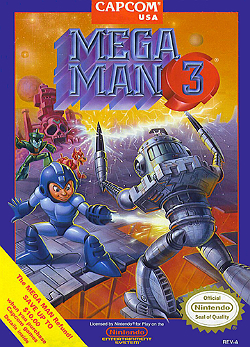
Mega Man 3 is an action-platform video game developed and published by Capcom for the Nintendo Entertainment System. It is the third game of the original Mega Man series and was originally released in Japan on September 28, 1990. The game was released in North America later in 1990 and in European regions by Nintendo in 1992. Taking place after the events of Mega Man 2, the plot follows the titular hero as he helps his creator, Dr. Light, and a supposedly former enemy, Dr. Wily, collect parts for a peace-keeping robot by defeating several Robot Masters that have gone haywire.
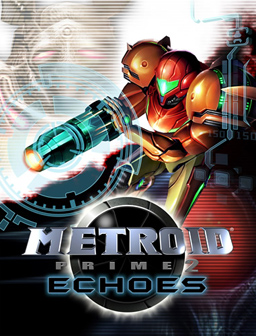
Metroid Prime 2: Echoes is an action-adventure game developed by Retro Studios and published by Nintendo for the GameCube. The sequel to Metroid Prime (2002) and the first Metroid game with a multiplayer feature, Echoes was released in North America, Europe and Australia in 2004 and in Japan under the name Metroid Prime 2: Dark Echoes in May 2005.

FIFA is a discontinued football video game franchise developed by EA Vancouver and EA Romania and published by EA Sports. As of 2011, the FIFA franchise has been localized into 18 languages and available in 51 countries. Listed in Guinness World Records as the best-selling sports video game franchise in the world, the FIFA series has sold over 325 million copies as of 2021. On 10 May 2022, it was announced that EA and FIFA's partnership of 30 years would come to an end upon the termination of their licensing agreement, making FIFA 23 the last entry to the franchise under the FIFA name. As a successor to the FIFA series, EA launched the EA Sports FC franchise, with EA Sports FC 24 being the first installment under the new name.

Star Fox Adventures is a 2002 action-adventure game developed by Rare and published by Nintendo. The game had a long development cycle starting in 1997. Originally developed as Dinosaur Planet with Rare-created characters as the protagonists, Nintendo producer Shigeru Miyamoto convinced Rare to redesign the game as part of the Star Fox franchise. Its planned release on the Nintendo 64 was cancelled, with development ultimately shifting forward one hardware generation to the GameCube.
Colonization of the Congo Basin refers to the European colonization of the Congo Basin of tropical Africa. It was the last part of the continent to be colonized. By the end of the 19th century, the Basin had been carved up by European colonial powers, into the Congo Free State, the French Congo and the Portuguese Congo.

Livingstone is a surname and given name. The surname is toponymic. It is one of the habitual surnames eventually adopted by members of the Scottish branch of the Irish Dunleavy /MacNulty royals, including the ancestors of the African missionary doctor and African explorer David Livingstone. There may be a relationship between the Livingstones and Clan MacLea.
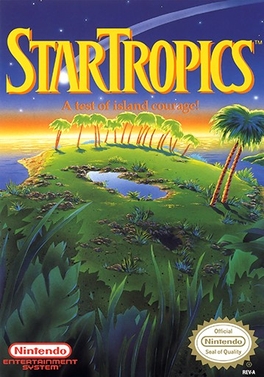
StarTropics is a 1990 action-adventure video game developed and published by Nintendo for the Nintendo Entertainment System. Unlike most of Nintendo's games, it was never released or intended to be released in Japan. It was released only in North America and Europe. It was produced, written and directed by Genyo Takeda of Nintendo Integrated Research & Development. StarTropics was followed by a sequel titled Zoda's Revenge: StarTropics II, released in 1994.
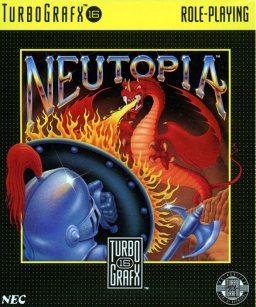
Neutopia is an overhead action-adventure video game developed by Hudson Soft. It was released by Hudson for the PC Engine in Japan on November 17, 1989. It was then released by NEC for the TurboGrafx-16 in North America in 1990. It was re-released for the Virtual Console service worldwide for the Wii in 2007; it was re-released for the PlayStation Network in Japan in 2010 and in North America in 2011. It was re-released for the Wii U on April 16, 2014 in Japan, and in USA and Europe in 2017. The game takes place in the land of Neutopia, where the evil demon Dirth has captured Princess Aurora and has stolen the eight ancient medallions which contain the wisdom and power necessary to maintain peace and prosperity throughout the land. It is up to the protagonist Jazeta to retrieve the eight medallions, defeat Dirth, rescue Princess Aurora, and save the land and its people.

Kid Icarus: Of Myths and Monsters is a platform game for the Game Boy developed by Nintendo Research & Development 1 and Tose, and published by Nintendo. It is a sequel to Kid Icarus (1986) for the Nintendo Entertainment System. It was released in North America on November 5, 1991, and in Europe on May 21, 1992. It was released in Japan on February 8, 2012, via the 3DS Virtual Console, where it retains its English title, to commemorate the release of Kid Icarus: Uprising, followed by its re-release in Europe on March 8, and North America on July 19. The story of Of Myths and Monsters is influenced by Greek and Roman mythology, and follows the angel soldier Pit on his quest for three sacred treasures. His objective is to defeat the demon Orcos, who has invaded the kingdom of Angel Land. The game features the core gameplay mechanics of its predecessor. Players explore two-dimensional environments while collecting items and fighting monsters. Of Myths and Monsters was named the 18th best Game Boy game by Nintendo Power, and commended by critics for its gameplay, graphics, and music.
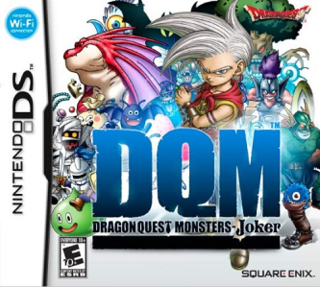
Dragon Quest Monsters: Joker is a Nintendo DS role-playing video game developed by Tose and published by Square Enix. It is the fourth installment of the Dragon Quest Monsters series. Square Enix released the game on December 28, 2006 in Japan and in North America on November 6, 2007.
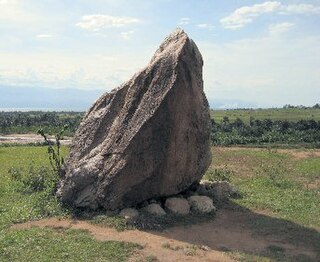
The Livingstone–Stanley Monument at Mugere marks a location where explorer and missionary Dr David Livingstone and journalist and explorer Henry Morton Stanley visited and spent two nights on 25–27 November 1871 in Burundi. It is 12 km south of the largest city and former capital Bujumbura, overlooking Lake Tanganyika. In French, it is referred to as La Pierre de Livingstone et Stanley. Some Burundians claim the location is where the famous first meeting of Livingstone and Stanley took place, at which the latter uttered the famous words "Dr Livingstone, I presume?".
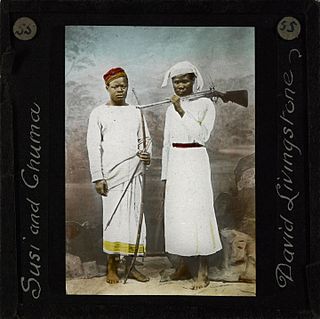
James Chuma and Abdullah Susi were people from central Africa who took part in the second Zambesi expedition led by the explorer David Livingstone, and were employed by him in his last expedition. They had significant roles in organisation, and were the first to greet Stanley when his search party made contact.
Professor Layton is a puzzle adventure video game series and transmedia franchise developed by Level-5. The property consists primarily of seven main video games, a mobile spin-off, an animated theatrical film, and an anime television series, while additionally incorporating an array of secondary titles and media, including a crossover game with Capcom's Ace Attorney series.

Professor Layton and the Last Specter, known in Europe as Professor Layton and the Spectre's Call, is a puzzle adventure video game produced by Level-5 for the Nintendo DS handheld game console. Last Specter is the fourth game in the Professor Layton series, and is a prequel that takes place three years before the first trilogy, detailing how Professor Layton met his apprentice, Luke Triton and introducing Layton's assistant Emmy Altava.

Professor Layton and the Miracle Mask is a puzzle adventure video game developed by Level-5. It is the fifth game in the Professor Layton series, the second in the prequel trilogy of games, and the first in the series to be developed for the Nintendo 3DS. Miracle Mask was released as a launch title for the Nintendo 3DS in Japan in February 2011, becoming the best-selling game on the day of the system's launch. The game was later released worldwide in October 2012. Professor Layton and the Miracle Mask Plus, an enhanced edition featuring new puzzles and added cutscenes, was released on the Nintendo eShop in Japan in February 2013.

















